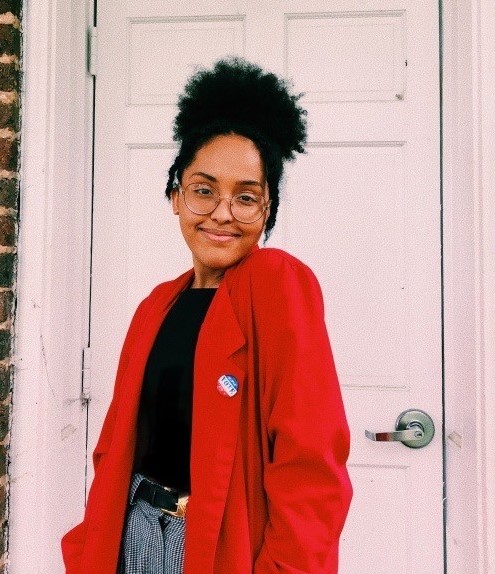Student research highlights the relationship between American identity and social contact with minoritized communities
April 7, 2022 - Liz Schondelmayer
What does it mean to be an American, how is this identity shaped and how does our identity inform our social relationships? These are all questions that graduate student Kelsey Osborne-Garth sought to answer during her time at Michigan State University through the MSU Summer Research Opportunities Program (SROP). Her research, supported by the MSU Women's Leadership Institute and the Tomlanovich Research Equity Fund, found that people with a high resonance to an “American identity” have weaker social ties to people in minoritized communities which may lead to higher levels of prejudice.
 Through this program, Kelsey (pictured left), a graduate student at Lee University studying political science, was paired with Dr. Nazita Lajevardi, an MSU political scientist whose research centers on the intersection between racial and ethnic identities and policy. Over the summer, Dr. Lajevardi served as a mentor to Kelsey, sharing data sets and providing guidance and feedback as Kelsey completed her project over a span of just 10 weeks.
Through this program, Kelsey (pictured left), a graduate student at Lee University studying political science, was paired with Dr. Nazita Lajevardi, an MSU political scientist whose research centers on the intersection between racial and ethnic identities and policy. Over the summer, Dr. Lajevardi served as a mentor to Kelsey, sharing data sets and providing guidance and feedback as Kelsey completed her project over a span of just 10 weeks.
Kelsey's research was inspired by the experiences she had while petitioning to remove a confederate statue across the street from her university in Cleveland, Tennessee. Her petition sparked a community-wide conversation and garnered more than 10,000 signatures - but it also led to protests, backlash and even death threats against her.
"When I would go to the protests, I would look across the street and I would see the people who threatened me, who sent me death threats, who doxxed my information online, and they were waving around American flags, spewing Bible verses and screaming, 'This is America!'" Kelsey recalled. "This caused me to wrestle with myself and question, if this is what being American means and if this is what patriotism looks like, what does that mean for me as a person of color and for other people who don't identify with these values?"
In this project, Kelsey explores the different ways that people define what it means to be an "American." While some define American identity inclusively as a resonance with American values such as freedom, independence and belonging, others define it rigidly, upholding a theory called "Nativism" - a theory which is gaining popularity in the United States. According to the research, this theory of American identity only includes people who are of Anglo-Saxon or northern European descent.
In her research, Kelsey analyzed a data set of more than 500 participants and found an inverse relationship between a strong American identity and overall social contact with minoritized groups - including immigrants, Black Americans, Latinx Americans, Asian Americans and Muslim Americans - in the form of familial relationships, friendships and acquaintanceships. The only exception to this was friendships with Black Americans, though it remained true for familial relationships and acquaintanceships.
The study highlights that ideology, political attention and racial resentment are all predictors of a strong nativist American identity, which is in turn linked to higher levels of support towards policies that target immigrants and minorities in the United States. It also explained how future research is needed to understand the relationships between identity and prejudice, and how the dynamic illustrated in this research impacts minoritized communities in America.
Kelsey's research was supported by the Tomlanovich Research Equity Fund, which provides support for both students and faculty who conduct research that advances the Women's Leadership Institute's mission of advancing leadership equity for women around the globe. According to the fund's website, it awards research that "focuses on topics, including but not limited to, gender equity and intersectionality with race, ethnicity, social class, and/or other social identity points."
Moving forward, Kelsey is looking to pursue a PhD in both American politics and racial and ethnic minority politics. For now, her focus is on research opportunities, but her long-term goals could include a career in academia. "I would love to be a professor. I've been a teaching assistant for about two years at Lee University, and I just love helping students, teaching lectures and conducting research," said Kelsey.
For any other students interested in pursuing a PhD, Kelsey emphasizes the validation and preparation that programs like SROP can provide. "I think anyone who is even remotely considering getting a PhD should apply for this program, because before this program, I never thought I could get a PhD," Kelsey explained. "But I found a passion that I never knew I had, and it puts you ahead of the game, because you already have research examples to provide to schools you're applying to in the future."

